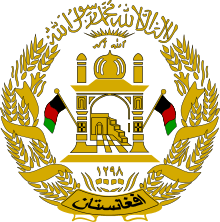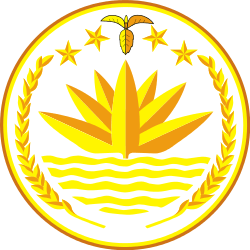Afghanistan–Bangladesh relations
 |
|
Afghanistan |
Bangladesh |
|---|---|
Afghanistan–Bangladesh relations refer to the bilateral relations between Bangladesh and Afghanistan.
History
During the Bangladesh Liberation War, the Kingdom of Afghanistan provided a critical safe passage to Bengali civilians based in West Pakistan. The People's Democratic Party of Afghanistan called for the swift recognition of the newly established state.[1]
In 2010, Former US Special Envoy to Afghanistan and Pakistan Richard Holbrooke requested Bangladesh to send combat troops to Afghanistan.[2] Few days later, SITE intelligence group published a report headlined "Afghan Taliban reacts to US requesting troops from Bangladesh" where the Taliban called for rejecting the US request.[3] Two days later, a press conference by the US embassy in Dhaka restated the request saying, "The United States has intensified its discussion on Bangladesh's engagement in Afghanistan for global peace and stability,".[4] However, there was a general consensus among the politicians of different political parties as well as the civil society members that Bangladesh should not send its troops to Afghanistan without the UN mandate.[3] Later, the government of Bangladesh declared that Bangladesh won't send any troops to Afghanistan but offered assistance on the rehabilitation and reconstruction of the war ravaged country.[5]
Cooperation in rebuilding Afghanistan
Bangladesh has been actively participating in the rebuilding process of Afghanistan which was also praised by the Afghan President Hamid Karzai.[6] Bangladesh has also offered to train Afghan civil servants, police personnel and diplomats and to create a skilled workforce. Bangladesh is also interested in providing technical and vocational training in the fields of banking, disaster management, primary and mass education, health care, agricultural etc.[7]
Several Bangladesh based NGOs are working for the socio-economic development of Afghanistan. Bangladesh based BRAC has been operating in Afghanistan since 2002. As of 2012, it had 173 offices across the country, affecting 29.8 million people.[8]
Afghanistan has sought Bangladesh's assistance on enhancing its education system.[9] In 2009, a 12-member delegation from Afghan universities visited Dhaka to gain experience on higher education system.[10] As of 2011, 35 Afghan students, were studying in Bangladeshi universities.[11]
Economic relations
Bangladeshi jute, ceramics and pharmaceutical products have good demands in the Afghan market.[12] Afghanistan has expressed interest to recruit manpower from Bangladesh for its reconstruction efforts.[13] In order to expand the bilateral trade, Afghanistan has proposed to create direct business link with Bangladesh.[14]
References
- ↑ Anthony Arnold. Afghanistan's Two-Party Communism: Parcham and Khalq. Hoover Press. p. 173. ISBN 978-0-8179-7793-1.
- ↑ "US asks for Bangladeshi troops in Afghanistan". The Daily Star. Retrieved 12 June 2014.
- 1 2 "Taliban warn Bangladesh". The Daily Star. Retrieved 12 June 2014.
- ↑ "US keen about Bangladeshi troops in Afghanistan". Bdnews24.com. Retrieved 12 June 2014.
- ↑ "Bangladesh would not send troops to Afghanistan: Hasina". The Indian Express. Retrieved 12 June 2014.
- ↑ "Karzai praises Bangladesh's Afghanistan rebuilding role". The Daily Star. Retrieved 12 June 2014.
- ↑ "Afghanistan to overcome challenges: Dr Dipu Moni". Bangladesh Sangbad Sangstha. Retrieved 12 June 2014.
- ↑ "Afghan Taliban kill BRAC official". New Age. Retrieved 12 June 2014.
- ↑ "Afghan envoy meets DU VC". Daily Sun. Retrieved 12 June 2014.
- ↑ "Bangladesh to help rebuild Afghanistan". The Daily Star. Retrieved 12 June 2014.
- ↑ "Efforts underway to enhance ties with Bangladesh". Pajhwok Afghan News. Retrieved 12 June 2014.
- ↑ "Kabul keen to import jute, ceramics, drugs from Bangladesh". Daily Sun. Retrieved 12 June 2014.
- ↑ "Afghanistan keen to recruit manpower from Bangladesh". The Daily Star. Retrieved 12 June 2014.
- ↑ "Kabul for more trade with Dhaka". New Age. Archived from the original on October 29, 2004. Retrieved 12 June 2014.

